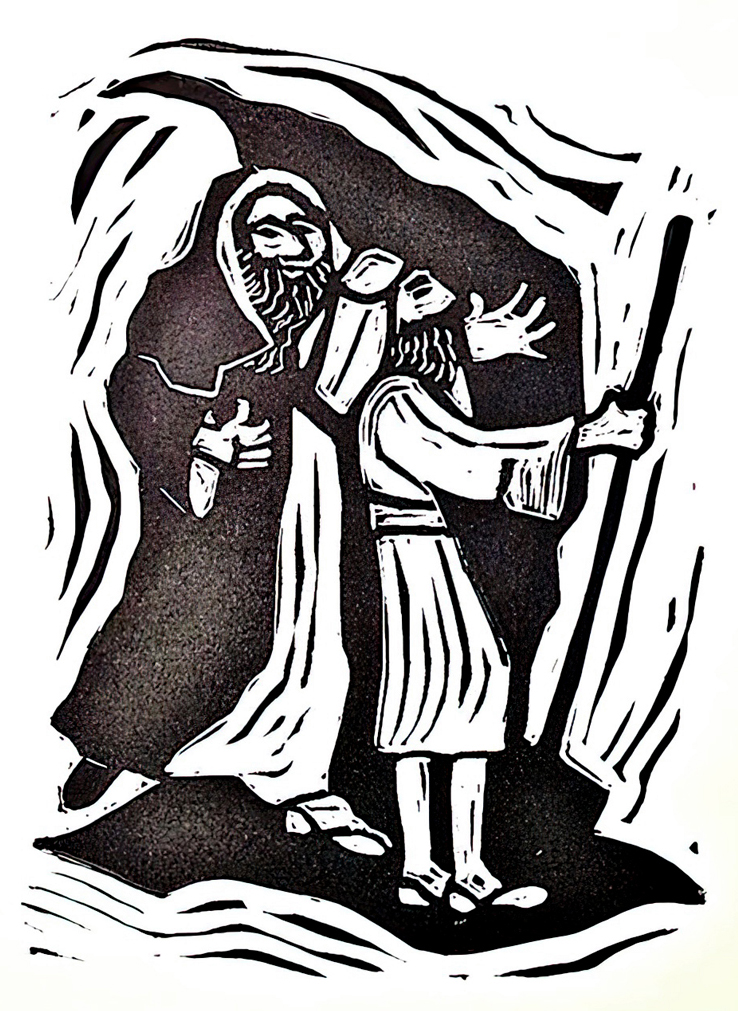Fourth Sunday in Lent
2 Corinthians 5:17-21; Psalm 32:1-8; Luke 15:1-3, 11b-32
Church of Scotland, Geneva, Auditoire de Calvin, March 30 2025
Twenty years ago, the Church of Scotland published the fourth edition of our church hymnary, known to most of us as CH4. Thanks to what has been called a “hymn explosion” – the proliferation of new hymns and new hymnwriters all around the world in the last sixty years and more, it is full of new music, with much of which our congregation has yet to get to grips.
But some of these new hymns have become firm favourites, so much so that we forget there was a time when we didn’t sing them, indeed, when we didn’t know they were there to sing.
Shirley Erena Murray’s hymn, “For everyone born, a place at the table”,[1] is one of these. We sing it with gusto or, at any rate, the Presbyterian equivalent of gusto, once we get our heads around the unexpected gap before the last phrase.
Hymns are dangerous things. They get into our bloodstream. They preach a better sermon than any I, or any other minister, can preach. But even when we like them, they may give us pause.
The table Murray is talking of is, first, the human table – the table of the family or the community. It is, second, the communion table, the table of the Lord’s Supper. And it is, finally, the table of the banquet in the kingdom of God.
At all of these tables, Murray claims, everyone has a place. Really? Literally everyone, from the orange nightmare in the White House to the annoying member in the next pew?
But Murray doubles down on her claim:
For just and unjust, a place at the table,
abuser, abused, with need to forgive,
in anger, in hurt, a mindset of mercy,
for just and unjust, a new way to live.
This is a challenging idea. We find it difficult to accept the idea that those who hurt and those who have been hurt may sit together at a common table. But this, says Murray, is what salvation is like.
She is thinking in the first place in personal and family terms: the wife or husband abused by their partner, the child abused by a parent, a relative, or a family friend. But her hymns always include both personal and political, and we can easily zoom out from the intimate family to all the families of the earth.
After bombing Gaza to bits for over a year, Benjamin Netanyahu is now bombing it to bits again.[2] For four weeks, he has steadfastly refused to allow food or any other form of aid to enter Gaza.[3] Children there are so hungry, they are drawing pictures of food in the sand.[4]
When the Methodist Church of Great Britain revised its hymnbook in 2011, it refused to include this hymn. It felt that it could prove difficult and extremely hurtful to anyone who had been in a situation of abuse.[5] And I don’t imagine that many in the tiny Christian community in Gaza are singing Murray’s hymn right now, with gusto or otherwise.
*
To them, and to all of us who are challenged as well as attracted by the idea of a new creation, a new way to live, Jesus tells the story of the man who had two sons.
They are both his sons, in different ways they are both lost, but he refuses to give up on either of them. He refuses to let either of them go.
The younger son is a rascal, a rapscallion, and a reprobate. The elder son is upright and dutiful but, as we learn, not without his faults.
The younger son asks for and is given his share of the father’s wealth and takes off. From then on, it’s Snakes and Ladders. He slides down a series of very long snakes until he ends at the very bottom: reduced to looking after another man’s pigs – a terrible thing for any Jew – reduced to coveting the food the pigs eat – a terrible thing for any human being.
He really is a lost son, but without him the family is not complete.
Meanwhile, the elder son has been quietly climbing a series of small ladders: looking after the family land, caring for his parents, working in the field. He is everything an elder son should be, but he is not forgiving.
At a turning point in the story, the younger son comes to his senses. He sees what a fool he has been and turns for home. Overjoyed to have his family reunited, the father throws the party of all parties.

But the elder son is not overjoyed. In Cara Hochhalter’s woodcut print in our order of service, we see him outside the party. “Here,” she says, “he is clenching his hoe in jealousy and anger. He refuses to even look at his father who has come out to plead with him to join the celebration.”[6] Now he becomes the lost son, and the family is again incomplete.
The story ends abruptly. We are left to wonder what happens next. What does the elder son do? Does he relent, respond to his father’s pleas, turn around and go into the party? And what does the younger son do the next morning, when he wakes up with a hangover?
Harry Kemp has a poem that fills in the ending.
I am the Elder Brother; I brought the sheep to the fold
When, spite of the wool he carried, the black ram shivered with cold…
I am the Elder Brother; I worked till far in the night
To see that the cows were foddered and the horses bedded right…
I am the Elder Brother; when HE came strolling back
I strove to send him packing…
Yes, I who had heaved and lifted along with the other men,
I urged the Old Man blackly to let him shift again. . . .
And each plea knotted me harder —
Till one day down in the village I heard a Young Man talk…
Of God … and Love … and Brothers … and He seemed to speak to me
As He told of the lost sheep straying far from the wonted track, —
For only that day, a fortnight, I brought one in on my back,
And I hadn’t stopped to chide it, but I had carried it in —
And I saw I’d treated it better than my own blood and kin;
And I went back home, and was decent…[7]
We may like to think that this is how it was.
*
The season of Lent is a time for giving up chocolate and beating ourselves up for our faults and failings. We are told that we are sinners, and we do our best to picture ourselves as such. We tell God: “How great you are, and what miserable wretches we are.”
In his morning prayer of confession,[8] Thomas Cranmer takes this to extremes:
Almighty and most merciful Father, we have erred, and strayed from your ways like lost sheep. We have followed too much the devices and desires of our own hearts. We have offended against your holy laws. We have left undone those things which we ought to have done, and we have done those things which we ought not to have done, and there is no health in us.
There is no health in us? Cranmer, I think we can see, is overegging the pudding. I’m not sure even he believes what he says.[9]
The problem here is that Cranmer and we are trying to picture ourselves as the younger son, the reprobate, and the shoe doesn’t quite fit.
We are respectable, church-going Christians. We do better, I suggest, to picture ourselves in the shoes of the elder brother. Too often, we rush to judgment and are quick to criticize and condemn.
But the Jesus Luke presents to us tells us to be merciful as our Father in heaven is merciful;[10] to be compassionate, as our Father in heaven in compassionate; to be generous, as our Father in heaven is generous. To recognize, with Shirley Erena Murray, that there is room at the table for the unjust and the reprobate, the abuser and the hurter and, yes, even the genocidal killer.
It’s difficult, of course. If it were easy, everyone would be doing it.
*
Perhaps we can begin with baby steps. Before moving on to the really tough cases, like Netanyahu, or Biden,[11] or Putin, or Trump, we can begin with ourselves.
One of the many challenges we shall face in the new phase of our life without a full-time minister is to become a more generous congregation, running to embrace one another, giving credit where credit is due, and saying “Thank you!” when thanks are in order. We already do this. Let’s try to do it more.
A man had two sons, and he would not let either go.
In this congregation, we are all God’s sons and daughters, we are all God’s children. Let’s remind ourselves that we are God’s family.
[1] CH4 685
[2] Daniel Estrin, “Why did Israel resume the war in Gaza?”, NPR, March 19 2025
[3] Cara Anna, “Israel has cut off all supplies to Gaza. Here’s what that means”, AP, March 2 2025. See also, “A timeline of Israel’s weaponisation of aid to Gaza”, Al Jazeera, March 25 2025
[4] Sharon Zhang, “Children in Gaza are so hungry they’re drawing pictures of food in the sand”, Truthout, March 27 2025
[5] “A jolt of reality – the hymns of Shirley Erena Murray”, The Methodist Church Resource Hub, nd. See also, T Wes Moore, “History of Hymns: ‘For Everyone Born’ by Shirley Erena Murray,” Discipleship Ministries, June 29 2016
[6] Cara B Hochhalter,“Commentary by the artist”
[7] Harry Kemp, “The Rhyme of the Elder Brother”
[8] Morning Prayer, from The Book of Common Prayer
[9] People on theological grounds, of course, can believe all kinds of unreasonable things
[10] Luke 6:36
[11] Biden, for all his public hand-wringing, is equally complicit in the genocide in Gaza

